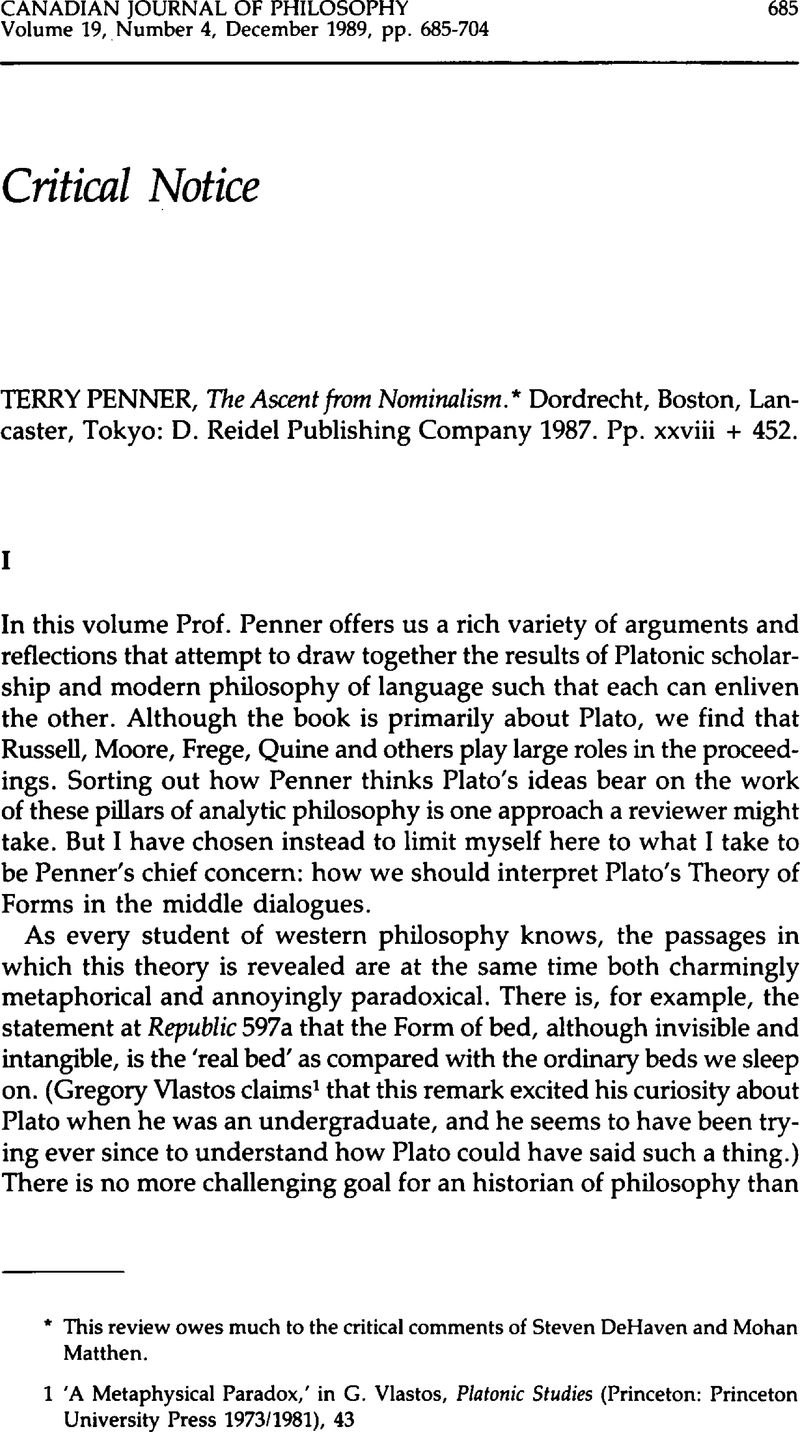No CrossRef data available.
Published online by Cambridge University Press: 01 January 2020

This review owes much to the critical comments of Steven DeHaven and Mohan Matthen.
1 ‘A Metaphysical Paradox,’ in Vlastos, G. Platonic Studies (Princeton: Princeton University Press 1973/1981), 43Google Scholar
2 Ascent, 24-5; 32-3; 86-95. Penner makes no distinction between meanings and universals. I shall go along with this, in my opinion, unfortunate practice until the last section.
3 See Ascent, 215 and ‘Clarification Three’ generally. This chapter I found the most cogent of the book.
4 Penner often says that in the middle dialogues Plato relies on ‘incorrigible conceptual states’ for gaining knowledge of the Forms. These states, he thinks, are required to make sense of a priori truths (see Ascent, 13-14; 30-1).
5 Penner’s use of the term ‘nominalism’ apes the careless usage of some contemporary philosophers who ignore its historical origin as referring to views which claim that all universals are signs of a certain sort. Platq’s concern is not with nominalism in this proper sense. Penner’s own definition of a nominalist as one who ‘holds that the only things that exist are concrete spatia-temporal objects’ (22) not only omits reference to signification but compels the nominalist to be a materialist as well.
6 In David Gallop’s (Plato, Phaedo [Oxford: Clarendon 1975]) translation the core argument reads as follows:
Look at it this way: don’t equal stones and logs, the very same ones, sometimes seem equal to one but not to another?
Yes, certainly.
But now, did the equals themselves ever seem to you unequal, or equality inequality?
Never yet, Socrates.
Then those equals, and the equal itself, are not the same.
7 The Hippias Major, which in style, at least, is more like the early dialogues than the middle, makes the point that attributions of beauty depend on comparisons and consequently the same thing can be both beautiful and ugly. See 288d-289d.
8 Vlastos discusses this passage in his ‘Degrees of Reality in Plato,’ in Platonic Studies, 66-7.
9 This reading of Phaedo 74b7-c5 aligns it with the contrast between Particulars and Forms that Plato draws at Republic 479a-c, a passage which is much less ambiguous than the Phaedo one.
10 ‘What did Socrates Understand by His “What is F?” Question?’ and ‘Socrates on “The Parts of Virtue,”’ both in Platonic Studies, 410-23
11 The Unity of Virtue; 38
12 Phaedo 74a9-12, 76d6, 100b1-c7; Republic 507a-b
13 R.E. Allen effectively, in my opinion, refuted this interpretation of Plato in his ’Participation and Predication in Plato’s Middle Dialogues,’ first published in 1960. See Allen, R.E. ed., Studies in Plato’s Metaphysics (London: Routledge & Kegan Paul 1965), 43-60Google Scholar.
14 Meta. A 987b7-10
15 Allen, 45-7. The eponymy theory has been well analyzed and its implications for the arguments of the Parmenides explained by Thomas Bestor in his ‘Common Properties and Eponymy in Plato’ (The Philosophical Quarterly 28 (1978)189-207) and his ‘Plato’s Semantics and Plato’s “Parmenides”’ (Phronesis 25 [1980) 38-75).
16 ‘The Third Man Argument in the Parmenides,’ in R.E. Allen, ed., Studies in Plato’s Metaphysics (231-63).
17 ‘Plato’s “Third Man” Argument (Parm. 132al-b2): Text and Logic,’ in G. Vlastos, Platonic Studies, 342-65